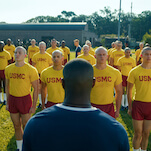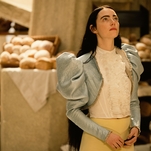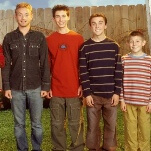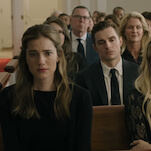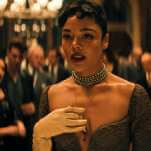It’s an odd war that Serena Joy and June wage in “First Blood,” an often excellent but ultimately baffling hour of The Handmaid’s Tale. It begins when Serena Joy, scared and guilty, literally removes the wall that separates her from the woman carrying “her” baby, giving her a chance to see it on an ultrasound monitor. It ends when she says “absolutely not,” refusing to give June a chance to see the baby who was stolen from her. Between those points, two women manipulate each other with kindness, a battle that each knows is taking place but which each also begins to believe, just a little. After that, it’s business as usual, though even more fraught than before.
That happens halfway through the episode.
That story is more than enough for one hour of The Handmaid’s Tale, a show that’s almost always at its best when it invests in the emotional journeys of its characters, including the monstrous ones. Part of what makes the performances of Ann Dowd and Yvonne Strahovski so compelling is that they recognize the importance of this aspect of the show. Watching Aunt Lydia, you don’t see any hint that the woman playing her knows her to be a villain; she’s compelled by god to safeguard the future of humanity, which to her takes the form of society’s breeding stock. She believes she’s right, she believes she’s saving these fallen women from themselves and saving the world, all at the same time. Physical and emotional abuse are among her many tools; so are “forgiveness” and maternal warmth.
Like Aunt Lydia, Serena Joy believes herself to be a hero in this story, someone who is helping to save humanity from destruction. Unlike Aunt Lydia, who doesn’t betray even a hint of remorse (the “willful” girls bring their punishments on themselves, after all), Strahovki’s performance often hints at, not remorse, but guilt and shame over the world she’s helped to create. Aunt Lydia believes in her bones that she’s doing what’s right for the world. Serena Joy seems to know that’s not the case, but also knows exactly how much it benefits her (and the ways in which it doesn’t). Lydia believes she’s a shepherd. Serena Joy knows she’s a thief. A thief, among other things.
This week, however, Serena Joy gets better at believing the story she tells herself, because in this story, she makes a new friend. As she goes out of her way to course-correct, driven by the fear of losing “her” baby and the knowledge that, as Aunt Lydia warned her, physical health wasn’t enough to ensure a successful pregnancy and her toxic household could be harmful, she tries being nice and finds she likes it. June reciprocates, in self-defense rather than greed, and finds she begins to believe it could be genuine. Then they stand in that nursery, and the artifice becomes clear again. Just because it feels nice doesn’t make it so.
With June’s request, Serena Joy gets to be a victim again. It’s not that June is a woman being held against her will in a house where she’s raped and abused and where her child will be taken from her, it’s that she’s manipulative and deceitful. After their confrontation, June’s rattled because she thought Serena Joy could be “decent.” Just decent. Serena is rattled because she thought they could be friends, just meeting at the ol’ brunch place for some banana nut pancakes and giggling about the nursery. That they both believe those things makes their obviously manipulative interactions more interesting, and the return to the status quo is even more fraught, because now Serena has the luxury of believing herself to be wronged. Her feelings are hurt.
Strahovski is so, so good here. In her hands, Serena Joy radiates intelligence, an element that makes this story work better than it otherwise might. It allows her to know she’s a monster, believe it’s a necessity, and feel herself the victim all at once. It’s a quality Strahovski shares with Moss, whose performance is similarly layered, particularly in her interactions with Eden (Sydney Sweeney), a victim who is also a danger. But Eden isn’t a Serena Joy or a June, neither a creator or benefactor of this system, nor a woman who understands herself to be a victim. She is, in a deeply unsettling and upsetting way, closer to an Aunt Lydia. She believes every inch of what she’s been told.
One of two knockout scenes in “First Blood,” the other being that nursery scene, June’s conversation with Eden sends the show in an effective and awful new direction. It reminded me of aspects of The Crucible, Arthur Miller’s McCarthy-era play centered on the Salem Witch Trials. In it, young girls seem to get so caught up in the story of the witches stalking Salem that they really believe they’re bewitched and tortured. They’re children, and they’re incredibly dangerous. A lesser show, and lesser performers, would treat Eden as either victim or danger, but not both. As Moss’s performance makes clear, she’s absolutely both, and when June spits “Oh, you have to fuck somebody you don’t want to? Poor thing,” she hammers that complexity home, too.
But not all of Handmaid’s, and of this episode in particular, is that complex. Rather, it is, but the show often opts for broad strokes. Part of what’s so jarring is the gap between the subtle performances and the show’s need to lay it on thick, as though we don’t already understand the horrors at work. Think of that modesty sheet, not just glimpsed, but lingered on; think of the long beat after Serena Joy asks what June and the second Ofglen talk about on their walks; think of the long preamble to the Commander’s assault of June in her bedroom. Sometimes this show’s tendency to operate at a 10 is the source of its power, and at others, it’s a weakness.
Never is that more apparent than when the show cuts from Ofglen’s suicide bombing to punk rock.
First, the Rachel and Leah Center storyline feels out of place with the episode as a whole; remove the flashbacks, here primarily to foreshadow that final moment, and it’s basically filler. Personally, I felt the episode end, then felt it end again, and then we got to the Center. This is likely to be hugely important to the series moving forward, but it feels every inch like a tacked-on cliffhanger that’s certainly shocking, but would be no less so as the start an hour not centered of subtle performances and often gentle manipulation.
Beyond that, the potency of that moment is thoroughly undercut by the musical choice. Are we meant to think, “wow, how bad-ass?” Because this story and these performances deserve far more nuance than that. Even if that weren’t the case, this is still an episode split into thirds: the real story, slightly short-changed; the fallout from that story, lingered on too long; the explosion at the end, belonging to another story entirely.
It looks great, it’s masterfully performed and designed, and it is absolutely gripping, from start to finish. It’s also a mess. This story already has plenty of power; whenever The Handmaid’s Tale feels compelled to remind us of that, it loses something. Let’s hope it lays off that particular button from now on.
Stray observations
- In addition to a role in Everything Sucks! this year, Sydney Sweeney also has roles the upcoming Sharp Objects miniseries for HBO, and in David Robert Mitchell’s Under The Silver Lake.
- I don’t know if the choice to use knitting needles for the “teaching” moment was deliberate, but they sure made that whole scene just a little bit darker.
- The lighting and cinematography are always gorgeous on this show, but in Eden and Nick’s awful potato dinner, things were especially beautiful. The choice to shoot her in such a beatific manner is a deeply creepy one.
- One instance in which I don’t mind the impulse to hit us over the head: Fred’s mansplaining before Serena’s speech. “Start a dialogue.” “A conversation.”
- Musical corner: “Oh Bondage Up Yours!” by X-Ray Spex. Good song, bad moment.
- Shut up, Donnie.


